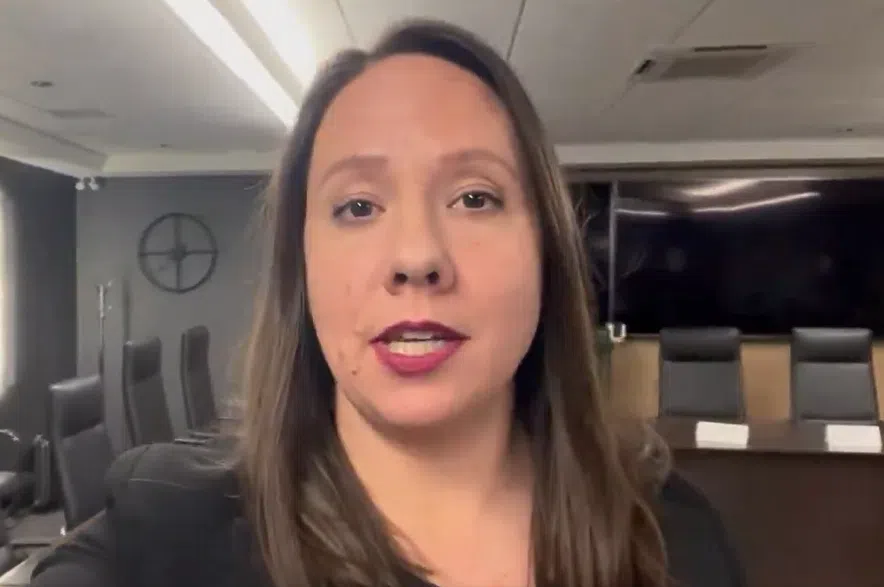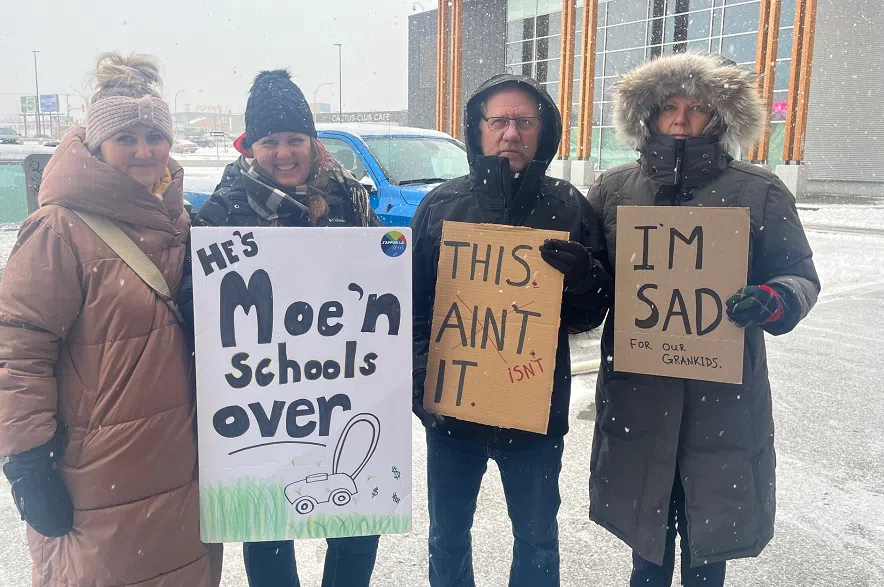The head of Saskatchewan’s teachers’ union says Premier Scott Moe is avoiding accountability by increasing education funding without enshrining it in a new contract.
Moe made the surprise announcement Wednesday evening, saying the budget – which is to be delivered March 20 – will include more than $356 million for classroom supports.
The premier said that represents an increase of more than $45 million over last year.
Moe said he made the announcement prior to budget day in the hope that the Saskatchewan Teachers’ Federation would suspend its ongoing sanctions – which have included rotating strikes and the withdrawal of both noon-hour supervision and extracurricular support – and return to the bargaining table.
Federation president Samantha Becotte said that’s not happening.
“The Saskatchewan Teachers’ Federation has been clear: We will not return to the bargaining table until government and Saskatchewan School Boards Association are willing to include a firm, irrevocable commitment in the collective agreement,” Becotte said in a statement.
STF members display their signs along Idylwyld Drive in Saskatoon on Feb. 7, 2024. (Mia Holowaychuk/650 CKOM)
Becotte said Moe is “avoiding accountability” by increasing funding through the provincial budget, because if the funding boost isn’t guaranteed through the new collective agreement the government could renege on its commitment at any point down the road.
“We have all lived through promises, so-called commitments and election year budgets only to have the funding clawed back or cut a year later. This is not bargaining at the table and it is not an irrevocable commitment in contract,” Becotte said.
“Saskatchewan students, families and teachers won’t fall for it.”
While the government has acknowledged the challenges many teachers face when dealing with large, complex classes, the government and Saskatchewan School Boards Association have both argued that those issues should be managed at the local level by school divisions rather than being built into a contract with teachers.
Becotte said the union’s sanctions will continue until stipulations around class size and classroom composition are put on the table by the provincial government.
“If government would simply bring these offers to the table a deal could be reached very quickly and all sanction activity would stop,” Becotte said.
“If government is truly committed to this funding and improving students’ learning conditions, they will put it in the collective agreement.”
The federation’s previous contract with the government expired in August, and an impasse in negotiations was declared in October.
Sanctions were briefly suspended in early February as the union was invited back to the table, but talks quickly collapsed and the sanctions were resumed.
The union’s sanctions are to resume on Friday, with teachers in some divisions withdrawing their voluntary noon-hour supervision.
Moe shares more details in interview with Evan Bray
Joining Evan Bray on Thursday, Moe said his government is fully accountable for the money it promises in the provincial budget.
“It’s an accountable document; it’s an agreement that governments have with the taxpayers and with the voters of the province, which include teachers,” the premier said.
Asked why Saskatchewan can’t follow the lead of other provinces and build class size and complexity into a collective agreement, Moe noted that salary plays a factor.
“Other provinces like British Columbia have it in the contract with respect to the number of students that can be in a class, but their teachers make $10,000 to $12,000 to $15,000 less, so they’re able to hire more teachers,” Moe said. “We don’t want to have that conversation here in Saskatchewan.”
Moe added the increased funding will allow school divisions to make decisions on where the resources will be allocated, and said his government won’t take that decision-making ability away from locally elected trustees.
When asked about the timing of his announcement, which came in a social media post shared at 5:15 p.m. on Wednesday, Moe said it was the quickest way to share the information widely across the province.
The premier said he didn’t alert the federation ahead of the announcement – which he called “a show of good faith” – because it pertained mainly to school divisions rather than the federation.
“When budgetary dollars flow, that conversation takes place with school divisions. When bargaining happens on what the wages will be for the STF, that happens collectively at the provincial table,” Moe said.
Asked if the Saskatchewan School Boards Association was alerted in advance, Moe said the government and association are in “ongoing conversations,” but didn’t answer directly.
The premier emphasized that if his Saskatchewan Party remains in government after this fall’s election, it will continue to build on its commitments to support teachers.
“We all agree there needs to be investment in the classroom support space,” Moe said. “You’re going to see continued building on this commitment into the future.”
Moe reiterated his invitation for the union to resume bargaining.
“That’s the one job that they have to do is actually go to the bargaining table and find an agreement,” Moe said.












